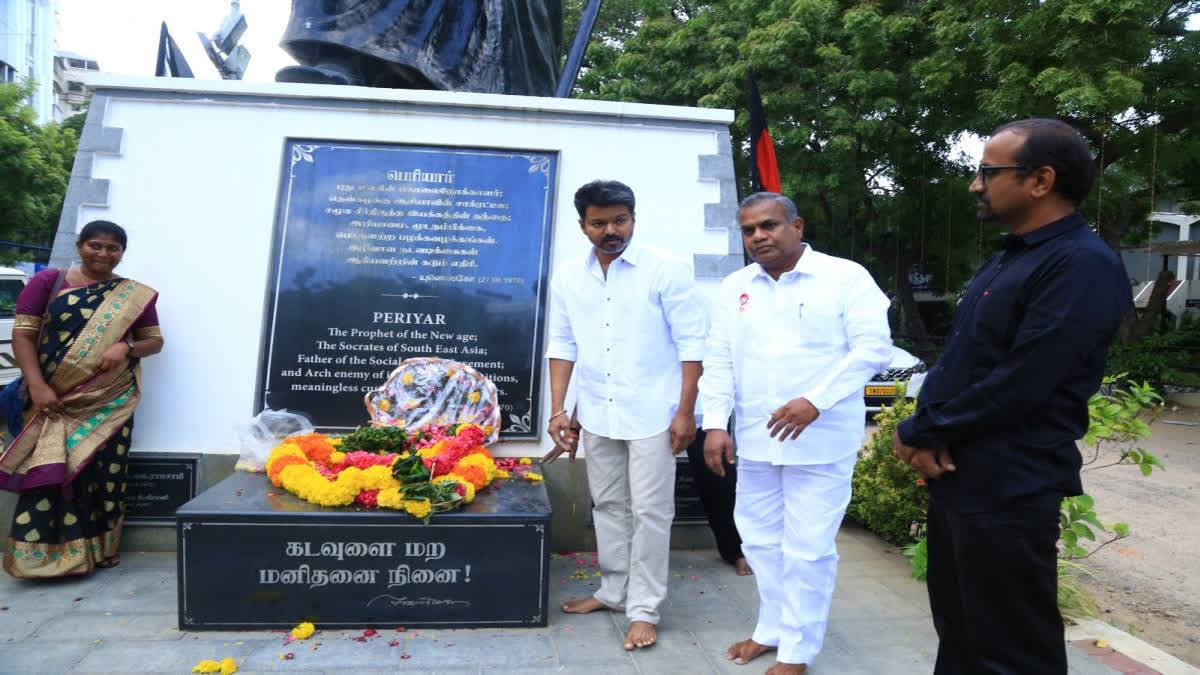Actor Vijay has announced the Tamizhaga Vetri Kazhagam (TVK) will hold its first state conference will be held on October 27 in Villurpuram district.
Vijay's garlanding the statue of E V Ramasamy (widely known as Periyar) in Periyar Thidal has propped up the debate over his political constituency, which he is expected to set out in the maiden party conference of his recently recognised political party.
Not just Periyar, the actor has greeted Prime Minister Narendra Modi on his birthday and also extended his greetings on the birth anniversary of former Tamil Nadu Chief Minister CN Annadurai. Last month, the actor unveiled his party flag and the anthem, which was meant to be a prelude to his actual political plunge.
On February 2, the top Tamil actor announced the launch of his political party. He drew his conviction to enter politics from the current situation which he said was "fraught with administrative deterioration, corruption and divisive politics that impedes unity".
The 50-year-old asserted that the people of the state were yearning for a change. "People of Tamil Nadu are yearning for a political movement that would pave the way for a selfless, transparent, visionary and efficient administration that is free of corruption, and caste and religious differences," he said.
When his party contests in the Legislative Assembly Elections in 2026 is likely to be the first major player with 'Tamil nationalism' at its core, if one were to go by what the symbols in the flag, anthem and name show. The actor has announced that there was a deep meaning to the party flag which he would reveal in the party conference.
There are no elements of 'Dravida' as was seen in the arch-rivals - the MK Stalin-led Dravida Munnetra Kazhagam(DMK) and the Edappadi K Palaniswami-led All India Anna Dravida Munnetra Kazhagam (AIADMK). The term Dravida was introduced in Tamil Nadu’s political scape by Periyar, who founded a political party – Dravidar Kazhagam – to reclaim the identity and self-respect of Tamils.
The DK party founded by Periyar espoused the formation of Dravida Nadu, an ethno-linguistic nation comprising Tamil, Telugu, Kannada and Malayalam speakers.
While the party did not subscribe to the electoral democracy, the off-shoot led by Annadurai who christened the erstwhile Madras State as Tamil Nadu was launched in 1949 and entered the electoral fray in 1957. The DMK romped to power 10 years later, a first for a Dravidian party.
From the DMK emerged the AIADMK (formerly ADMK) and the Vaiko-led MDMK(Marumalarchi Dravida Munnetra Kazhagam). The youngest of a Dravidian party which had some electoral success was the late-Vijaykant-led DMDK (Desiya Murpokku Dravida Kazhagam). Their flags flaunt elements and blocks in black, while conspicuously bearing "Dravida" in their names.
In 1967, Periyar, in a statement published in the DK’s mouthpiece, Viduthalai, said the pro-society policies of the ruling party (read DMK) will remain the same as long as the term "Dravida" is retained in its name and the colours - red and black - figured in their flag. This was his assurance to the people of the state barely a few months after the Dravidian party was voted to power with a thumping majority. The statement formed a part of the editorial, showering accolades to the then Hindu Religious and Charitable Endowments Minister VR Nedunchezhiyan, a staunch atheist.
Cut to 2024, this fanclub-based political party budding from Tamil Nadu has shied away from using Dravida and chose to go with Tamizhaga Vetri Kazhagam (TVK).
When the flag was introduced by the actor last month, Shoba Chandrasekhar, in a brief interaction with the media, said her son Vijay will uphold Tamil culture. In her message, she asked Vijay to uphold Tamil culture, safeguard women's rights, and bring in revolutionary policies, benefiting the people. As a mother, she has made it obvious what the actor's political plot would be.
The anthem's lyrics and its animated visualisation symbolise Tamil pride on many aspects. The lyric identifies Vijay as having come to protect Aadhi Kudi, a reference to Tamils in its classic literature.
